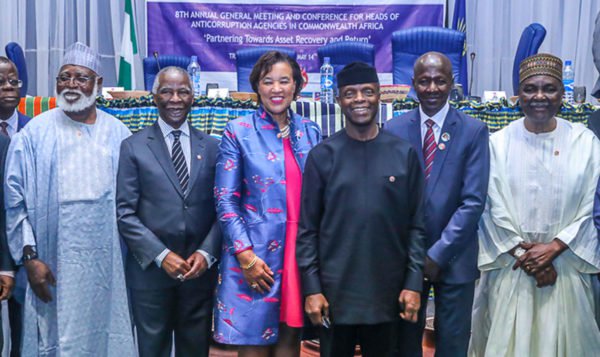News
In Damning Report, US Says Impunity, Massive Corruption Still Prevalent in Nigeria


• Shiite, IPOB extrajudicial killings, Dasuki’s detention cited as rights abuses, violation of rule of law
The United States Department of State has again issued a damning assessment of Nigeria under the leadership of President Muhammadu Buhari in its 2017 Country Report on Human Rights released last Friday in Washington D.C.
In the 48-page report posted on the website of the State Department, the U.S. government said impunity remained widespread at all levels of government in Nigeria, further noting that the Buhari-led administration lacked transparency.
A copy of the report obtained by THISDAY, added that government officials engaged in massive corruption.
Corruption, the report said, was not limited to government officials but very rampant among the security agencies.
The report stated: “Although the law provides criminal penalties for conviction of official corruption, the government did not implement the law effectively, and officials frequently engaged in corrupt practices with impunity.
“Massive, widespread, and pervasive corruption affected all levels of government and the security services.”
On the anti-corruption agencies, the report noted that although the Independent Corrupt Practices and Other Related Offences Commission (ICPC) and the Economic and Financial Crimes Commission (EFCC) efforts remained largely focused on low – and mid-level government officials, following the 2015 presidential election both organisations started investigations into and brought indictments against various active and former high-level government officials.
It, however, observed that the EFCC often did not observe all due process safeguards and refused to obey court orders granting bail to the former National Security Adviser (NSA), Sambo Dasuki.
“Many of these cases were pending in court. According to both ICPC and EFCC, the delays were the result of a lack of judges and the widespread practice of filing for and granting multiple adjournments.
“EFCC’s arrests and indictments of politicians continued throughout the year, implicating a significant number of opposition political figures and leading to allegations of partisan motivations on the part of the EFCC.
“In a case brought by the EFCC, in November a federal court convicted four firms allegedly used by a former aide of former President Goodluck Jonathan of laundering 1.67 billion naira ($$55.3 million) in stolen funds.
“In its pursuit of corruption, the EFCC often did not observe all pertinent due process safeguards. In November, the Economic Community of West African States Court of Justice declared unlawful the arrest and detention in 2015 of former national security adviser, Sambo Dasuki.
“A court ordered him released on bail in a case brought by the EFCC for the alleged diversion of 13.6 billion naira ($$443.2 million) intended to purchase military material during the Jonathan administration. Despite the court order, he remained in detention,” said the report.
In support of the claim that impunity remains the order of the day in Nigeria, the report further noted that government did not often take steps to prosecute officials who perpetuated impunity whether in the security forces or elsewhere in government.
It, however, acknowledged that government did take steps to investigate such impunity but failed to bring to book those who violated the law.
The report cited various instances including the atrocities allegedly committed in the North-east by members of the Civilian Joint Task Force (CJTF) and the refusal to bring to justice military men who killed members of the Shia group Islamic Movement of Nigeria in 2015 in circumstances adjudged to be extrajudicial.
“As of November, the government had not adequately investigated or held police or military personnel accountable for extrajudicial killings of supporters of the Indigenous Peoples of Biafra,” the report added.
Excerpts from the report added: “Authorities generally did not hold police, military, or other security force personnel accountable for the use of excessive or deadly force or for the deaths of persons in custody.
“State and federal panels of inquiry investigating suspicious deaths generally did not make their findings public.
“In August, the acting president (Yemi Osinbajo) convened a civilian-led presidential investigative panel to review compliance of the armed forces with human rights obligations and rules of engagement. As of November, the panel had not issued a report.”
The state department report stated that respect for human rights generally remained appalling in Nigeria.
The report identified the following as the most significant human rights abuses: extrajudicial and arbitrary killings; disappearances and arbitrary detentions; torture, particularly in detention facilities, including sexual exploitation and abuse; use of children by some security elements, looting, and destruction of property; civilian detentions in military facilities, often based on flimsy evidence; denial of fair public trial; executive influence on the judiciary; infringement on citizens’ privacy rights; restrictions on freedoms of speech, press, assembly, and movement; official corruption; lack of accountability in cases involving violence against women and children, including female genital mutilation/cutting and sexual exploitation of children; trafficking in persons; early and forced marriages; criminalisation of status and same-sex sexual conduct based on sexual orientation and gender identity; and forced and bonded labour.
Speaking during the official release of the report, the acting Principal Deputy Assistant Secretary, Bureau of Democracy, Human Rights and Labour of the US Department of State, Mr. Michael Kozak, said the 2017 report marked the 42nd year that the U.S. has published the country-specific annual Human Rights Reports.
He said the law requires the U.S. executive to produce the report every year.
According to him, “This goes back to the 1970s when Congress said to the Executive Branch, ‘When we’re making decisions about foreign assistance and security assistance and trade agreements and all of that, we’d really like to know: what is the human rights situation in the countries that we’re dealing with’.”
He said the U.S. did not produce the report to pass judgment “on other countries, or to name and shame”.
“It’s to fulfil a statutory responsibility to our Congress to try to produce the most accurate description of what we find is going on in other countries so that they can use that in making decisions,” he explained.
Efforts to get the Minister of Information and Culture, Mr. Lai Mohammed, to react to the report proved abortive as his phone was switched off.
Source: ThisDay
News
The Peruvian Government Has Officially Classified Transgender, Nonbinary And Intersex People As “Mentally ill”


According to the country’s ministry of health, the controversial decision was made to ensure the country’s public health services could “guarantee full coverage of medical attention for mental health” for the trans community.
It also categorises “dual-role transvestitism,” “fetishistic transvestism,” and “other gender identity disorders” under the same bracket of mental illness.
The new law will change language in the Essential Health Insurance Plan (PEAS) to reflect the view of trans and intersex people as a mental health disorder.
Trans groups across Peru have loudly condemned the decision as a step backwards for the country’s already complex relationship with LGBTQ+ rights.
News
Math Teacher Accused Of Having Sex With 2 Students And Getting Pregnant For One Tearfully Reveals The Baby Was Taken Away From Her


The UK teacher who had a baby with an underage student while on trial for having sex with another teenage boy broke down in court after revealing her newborn baby girl had been “taken away” from her.
Manchester math teacher Rebecca Joynes, 30, sobbed to jurors over how her baby was taken “24 hours after being born” this past January — and now she only sees her for nine hours a week, Joynes told jurors on Monday, May 13, according to the Manchester Evening News.
“At the moment I have contact with her three times a week for three hours and that’s it,” she said through tears.
Joynes was arrested and released on bail on orders not to have unsupervised contact with anyone under 18 after allegedly grooming her pupil, known as Boy A in court, by buying him a $430 Gucci belt before bringing him to her apartment for unprotected sex.
She was suspended from school and eventually fired, but soon after, she began having a relationship with a 15-year-old boy, known in court as Boy B, whom she had a baby with in January.
Joynes, who has denied having sex with either boy when they were underage, told the court that when she learned of the allegations against her she had gone to the second boy in a “panic” and he deleted all of her phone’s content.
The former teacher denied having a sexual relationship with the second boy until after he turned 16 and she was already suspended from teaching.
According to her narration,
She said he had added her on Snapchat twice, which she only accepted the second time because she thought he “wanted to tell her something.”
Joynes said a friendship developed and he quickly became her “best friend” even though the boy would make flirtatious and sexualized comments toward her when he was drunk.
She told jurors that it wasn’t until after his 16th birthday that he messaged her saying “I’ve left school now” with a winky face.
After she received notice that she had been dismissed from her job, he went to her apartment, where following an emotional conversation, they had sex.
The two then entered a relationship that Joynes described as “quite toxic” telling the court how the teenager was “very controlling.”
After discovering she was pregnant, Joynes hid love notes for the boy to find around her apartment.
The notes eventually led to a piece of baby clothing that had the words “I love my daddy to the moon and back” written on it.
The court was told that she gave birth to their baby girl in January, but following an emergency court hearing, the newborn was taken away from Joynes.
Joynes has denied two counts of sexual activity with Boy A; two counts of sexual activity with Boy B; and two counts of sexual activity with Boy B while being a person in a position of trust.
Her trial is ongoing.


News
First Man To Receive Pig Kidney Transplant Has Died


The first Man to receive a genetically modified pig kidney transplant has died two months after the operation.
Massachusetts General Hospital (MGH), which carried out the procedure in March, announced Sunday, May 12, that Richard “Rick” Slayman, 62, has died.
They said there was no indication his death was a result of the transplant.
Transplants of other organs from genetically modified pigs have failed in the past, but the operation on Mr Slayman, who was suffering with end-stage kidney disease, was hailed as a historic milestone.
In addition to kidney disease, Mr Slayman also suffered from Type 2 diabetes and hypertension.
In 2018, he had a human kidney transplant, but it began to fail after five years.
Following his pig kidney transplant on March 16, his doctors confirmed he no longer needed dialysis after the new organ was said to be functioning well.
“Mr Slayman will forever be seen as a beacon of hope to countless transplant patients worldwide and we are deeply grateful for his trust and willingness to advance the field of xenotransplantation,” MGH said in a statement.
Xenotransplantation is the transplanting of living cells, tissues or organs from one species to another.
MGH said it was “deeply saddened” at his sudden death and offered condolences to his family.
Mr Slayman’s relatives said his story was an inspiration.
“Rick said that one of the reasons he underwent this procedure was to provide hope for the thousands of people who need a transplant to survive,” they said.
“Rick accomplished that goal and his hope and optimism will endure forever.
“To us, Rick was a kind-hearted man with a quick-witted sense of humour who was fiercely dedicated to his family, friends, and co-workers,” they added.
While Mr Slayman received the first pig kidney to be transplanted into a human, it is not the first pig organ to be used in a transplant procedure.
Two other patients have received pig heart transplants, but those procedures were unsuccessful as the recipients died a few weeks later.
In one case, there were signs the patient’s immune system had rejected the organ, which is a common risk in transplants.
-



 Entertainment3 days ago
Entertainment3 days agoWhy I’m Not Ready For Kids – Singer Burna Boy Reveals
-



 Entertainment4 days ago
Entertainment4 days agoMen Of The Lagos State Police Command Have Arrested Singer Portable
-



 GROpinion3 days ago
GROpinion3 days agoExposing the Malicious Sabotage of MoMo PSB Project in Enugu Ezike
-



 News3 days ago
News3 days agoThe Peruvian Government Has Officially Classified Transgender, Nonbinary And Intersex People As “Mentally ill”









